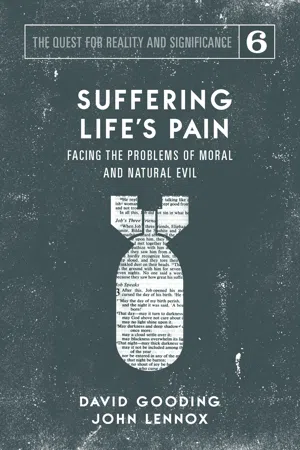
eBook - ePub
Suffering Life's Pain
Facing the Problems of Moral and Natural Evil
- English
- ePUB (mobile friendly)
- Available on iOS & Android
eBook - ePub
About this book
In Book 6 – Suffering Life's Pain, Gooding and Lennox acknowledge the problem with believing in a wise, loving and just God who does not stop natural disasters or human cruelty. Why does he permit congenital diseases, human trafficking and genocide? Is he unable to do anything? Or does he not care? Gooding and Lennox offer answers based on the Creator's purpose for the human race, and his entry into his own creation.
Frequently asked questions
Yes, you can cancel anytime from the Subscription tab in your account settings on the Perlego website. Your subscription will stay active until the end of your current billing period. Learn how to cancel your subscription.
No, books cannot be downloaded as external files, such as PDFs, for use outside of Perlego. However, you can download books within the Perlego app for offline reading on mobile or tablet. Learn more here.
Perlego offers two plans: Essential and Complete
- Essential is ideal for learners and professionals who enjoy exploring a wide range of subjects. Access the Essential Library with 800,000+ trusted titles and best-sellers across business, personal growth, and the humanities. Includes unlimited reading time and Standard Read Aloud voice.
- Complete: Perfect for advanced learners and researchers needing full, unrestricted access. Unlock 1.4M+ books across hundreds of subjects, including academic and specialized titles. The Complete Plan also includes advanced features like Premium Read Aloud and Research Assistant.
We are an online textbook subscription service, where you can get access to an entire online library for less than the price of a single book per month. With over 1 million books across 1000+ topics, we’ve got you covered! Learn more here.
Look out for the read-aloud symbol on your next book to see if you can listen to it. The read-aloud tool reads text aloud for you, highlighting the text as it is being read. You can pause it, speed it up and slow it down. Learn more here.
Yes! You can use the Perlego app on both iOS or Android devices to read anytime, anywhere — even offline. Perfect for commutes or when you’re on the go.
Please note we cannot support devices running on iOS 13 and Android 7 or earlier. Learn more about using the app.
Please note we cannot support devices running on iOS 13 and Android 7 or earlier. Learn more about using the app.
Yes, you can access Suffering Life's Pain by David W. Gooding,John C. Lennox in PDF and/or ePUB format, as well as other popular books in Philosophy & Ethics & Moral Philosophy. We have over one million books available in our catalogue for you to explore.
Information
The Problem of Moral Evil

Chapter 1Looking for Answers to the Problem of Moral Evil
Epicurus’ old questions are yet unanswered. Is he [God] willing to prevent evil, but not able? then is he impotent. Is he able, but not willing? then is he malevolent. Is he both able and willing? whence then this evil?——David Hume, Dialogues Concerning Natural Religion

The extent of the problem
To grasp the extent of moral evil we need go back no further than the last century and think of the millions massacred in the two world wars; of the hundreds of thousands starved, tortured, gassed and eliminated in the concentration camps and gulags; of the killing fields of Cambodia; of American use of Agent Orange in Vietnam; of the genocide in Rwanda and Yugoslavia; and of religiously motivated riots, bloodshed and persecutions in various parts of the world.
It is, then, this problem of moral evil that we must discuss in this present chapter. It raises two fundamental questions:
Question 1. If there is a God in heaven who is all-powerful, all-wise and all-loving, and is supposed to care for justice, why does he allow such evil to continue? Why does he not intervene and suppress those who perpetrate these crimes and put an end to their monstrous behaviour? Indeed, why did he allow such evil to exist in the first place?
The second question probes deeper still, and challenges faith in the very existence of God.
Question 2. How can we contemplate the vast amount of moral evil in the world, and still believe in the existence of an all-loving, all-wise and all-powerful God who is supposed to have created this world, and is ultimately responsible for it?
Two different attitudes and responses
This double problem is felt at two levels. We’ll take as examples the way the questions are raised in Dostoevsky’s and David Hume’s writings.
In The Brothers Karamazov, Dostoevsky has Ivan exclaim to Alyosha:
Tell me yourself directly, I challenge you—reply: imagine that you yourself are erecting the edifice of human fortune with the goal of, at the finale, making people happy, of at last giving them peace and quiet, but that in order to do it it would be necessary and unavoidable to torture to death only one tiny little creature, that same child that beats its breast with its little fist, and on its unavenged tears to found that edifice, would you agree to be the architect on those conditions, tell me and tell me truly?1
Ivan in the end maintains that he does not reject God; but in view of the hideous evil in the world, particularly the cruelty perpetrated on little children, he cannot bring himself to believe in the eventual reconciliation of all things and the universal harmony promised in the Bible, nor does he wish to have any part in that harmony on the terms and conditions which (he imagines) the Bible lays down for it:
I do not want harmony, out of a love for mankind I do not want it. I would rather to be left with sufferings that are unavenged. Let me rather remain with my unavenged suffering and unassuaged indignation, even though I am not right. And in any case harmony has been overestimated in value, we really don’t have the money to pay so much to get in. And so I hasten to return back my entry ticket. And if I am at all an honest man, I am obliged to return it as soon as possible. That is what I am doing. It isn’t God I don’t accept, Alyosha, it’s just his ticket that I most respectfully return to him.2
Here speaks a man for whom the problem of moral evil provokes the most intense and unpacifiable feelings of indignation in his heart.
By contrast, the philosopher David Hume sees the problem raised by moral evil in formal, objective, intellectual terms. In his famous Dialogues Concerning Natural Religion (DNR), Part X, he puts the problem into the mouth of Philo, one of the participants in the dialogue, thus:
Epicurus’ old questions are yet unanswered. Is he [God] willing to prevent evil, but not able? then is he impotent. Is he able, but not willing? then is he malevolent. Is he both able and willing? whence then this evil?3
A preliminary difficulty in answering the problem
Providing satisfying answers to the problem is not easy, for the simple reason that what people think about the problem will depend very much on their relationship to the actual experience of evil and the suffering it causes.
If, for instance, as a victim of moral evil you have suffered, or are still suffering, mental and physical anguish, or are smarting under a sense of massive injustice, mere intellectual solutions to the problem will scarcely be enough. You will be looking for answers that will soothe your anguish, satisfy your moral indignation, and give you hope, strength and courage to endure with solid hope for the future.
Moreover, when people are suffering under massive and monstrous evil, they often pray to God to intervene and stop the perpetrators of the evil. If God then appears to do nothing about it, a common reaction is to abandon all faith in God and to decide that atheism must be true. For the moment, at least, atheism seems to get rid of the problem.
But atheism itself, as we shall presently see, raises severe moral and intellectual problems which call for rigorous intellectual answers; for although atheism seems at first to solve the problem, it proves, upon inspection, to make the problem ten thousand times worse.
First, then, let us consider a philosophical statement of the problem in its extreme form, namely that the prevalence of monstrous evil is an insurmountable barrier to belief in God—at least in God as understood by the monotheistic religions.
A philosophical statement of the problem
The problem of moral e...
Table of contents
- Illustrations
- Series Preface
- Analytical Outline
- Series Introduction
- Part 1. The Problem of Moral Evil
- 1. Looking for Answers to the Problem of Moral Evil
- 2. Human Free will: the Glory
- 3. Why Doesn’t God Intervene and Stop Evil?
- 4. God’s Judgment of the World
- Part 2. The Problem of Natural Evil
- 5. The Problem of Pain and Suffering
- 6. God’s Major Purposes for the Human Race
- 7. Broken Human Nature and Natural Evil
- 8. Pain, Suffering and the Individual
- 9. Glory Through Suffering
- Series Conclusion
- Appendix: The Scientific Endeavour
- Series Bibliography
- Study Questions for Teachers and Students
- Scripture Index
- General Index
- About the Authors